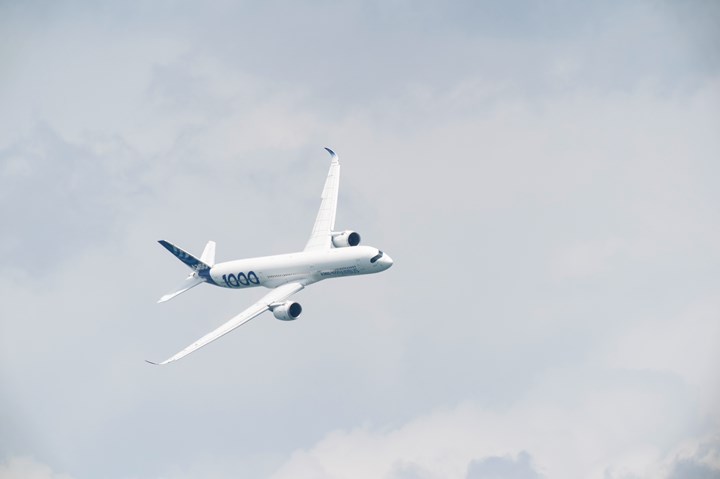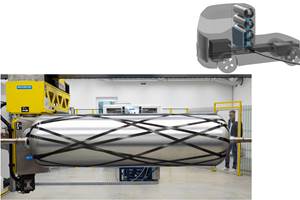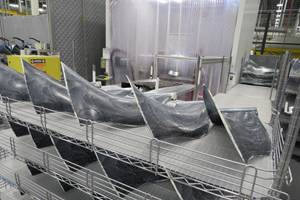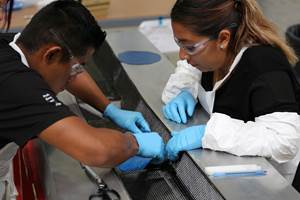Airbus discloses strong full-year 2021 results
Full-year 2021 reflected 771 gross commercial aircraft orders and 611 delivered, with revenue totaling €52.1 billion. Despite the pandemic, 2021 indicated Airbus’ strong operational performance.

Airbus’ lying display of the long-range A350-1000 at the 2022 Singapore Airshow. Photo Credit: Airbus SAS 2022, Bryan Van Der Beek
On Feb. 17 Airbus SE (Amsterdam, Netherlands) reported consolidated full-year (FY) 2021 financial results and provided guidance for 2022. Key highlights include 611 commercial aircraft delivered in 2021, €52.1 billion in revenue — with financials reflecting strong operational performance group-wide — and the issuing of the company’s 2022 goals.
“2021 was a year of transition, where our attention shifted from navigating the pandemic towards recovery and growth. Thanks to the resilience and efforts of our teams, customers and suppliers, we delivered remarkable full-year results,” says Guillaume Faury, Airbus CEO. “The strong financials reflect the higher number of commercial aircraft deliveries, the good performance of our Helicopters and Defence and Space businesses as well as our efforts on cost containment and competitiveness. Record net income and our efforts to strengthen the net cash position underpin our proposal to reintroduce dividend payments going forward. At the same time, we continue to invest in our strategic priorities and in the transformation of our company.”
Gross commercial aircraft orders totaled 771 (compared to 2020: 383 aircraft) with net orders of 507 aircraft after cancellations (2020: 268 aircraft). Included were the first A350 freighter orders, confirming customer demand for this new program. The order backlog was 7,082 commercial aircraft as of Dec. 31, 2021 (end of 2020: 7,184 aircraft). Airbus Helicopters booked 414 net orders (2020: 268 units), achieving a book-to-bill ratio well above one both in terms of units and in value. These included 52 H160s of which 30 were the first batch of H160M military versions for France’s Joint Light Helicopter program. Airbus Defence and Space’s order intake by value increased to €13.7 billion (2020: €11.9 billion), representing a book-to-bill ratio of around 1.3. Included were key orders in the Military Aircraft business such as the in-service support of the German and Spanish Eurofighter fleets as well as good export momentum for the C295, A330 MRTT and A400M airlifter.
Consolidated order intake by value increased to €62.0 billion (2020: €33.3 billion) with the consolidated order book valued at €398 billion on Dec. 31, 2021 (year-end 2020: €373 billion). The increase in the backlog value mainly reflected the strengthening U.S. dollar, Airbus notes.
Consolidated revenues increased 4% to €52.1 billion (2020: €49.9 billion), primarily reflecting the higher number of commercial aircraft deliveries, partially offset by less favorable foreign exchange rates. A total of 611 commercial aircraft were delivered (2020: 566 aircraft), comprising 50 A220s, 483 A320 Family, 18 A330s(1), 55 A350s and 5 A380s. Revenues generated by Airbus’ commercial aircraft activities increased 6%, largely reflecting the higher deliveries compared to 2020. Airbus Helicopters delivered 338 units (2020: 300 units), including the first H160, with revenues rising 4% reflecting growth in services and the higher deliveries. Revenues at Airbus Defence and Space decreased by 2%, mainly driven by Military Aircraft, and partially offset by Space Systems. Eight A400M aircraft were delivered in 2021.
Consolidated EBIT Adjusted was reported to be €4,865 million (2020: €1,706 million). EBIT Adjusted is an alternative performance measure and key indicator capturing the underlying business margin by excluding material charges or profits caused by movements in provisions related to program, restructuring or foreign exchange impacts as well as capital gains/losses from the disposal and acquisition of businesses.
Q4 2021 EBIT Adjusted declined by 18% to € 1,496 million, mainly reflecting the lower commercial aircraft deliveries as well as a negative year-on-year impact from currency hedging.
EBIT Adjusted related to the following:
- Airbus’ commercial aircraft activities increased to €3,570 million (2020: €618 million), mainly driven by the delivery performance and efforts on cost containment and competitiveness.
- Airbus Helicopters increased to €535 million (2020: €471 million), mainly driven by support and services, program execution and cost focus.
- Airbus Defence and Space increased to €696 million (2020: €660 million), reflecting continued cost containment.
Consolidated EBIT (reported) amounted to €5,342 million (2020: € -510 million), including net adjustments of € +477 million.
Airbus notes that commercial aircraft production is progressing in line with previously announced plans, in a complex environment. Specifically on the A320 Family, the ramp-up is on trajectory to achieve rate 65 by summer 2023 and the company continues to de-risk, notably by enabling all assembly sites to become A321-ready. For A320 Family production rates beyond 2023, the company is still in the assessment phase and working with suppliers to potentially enable an increase above rate 65.
Of the A400M program, development activities continued toward achieving the revised capability roadmap. Retrofit activities are progressing in close alignment with the customer. In Q4 2021, a charge of €0.2 billion was recorded, mainly reflecting the updated estimates of the delivery pattern of the launch contract. This is reflected in EBIT reported.
The financial result was € -315 million (2020: € -620 million), reflecting the net interest result of € -246 million, as well as the revaluation of financial instruments and of certain equity investments. Consolidated net income was € 4,213 million (2020 net loss: € -1,133 million) with consolidated reported earnings per share of €5.36 (2020 loss per share: € -1.45).
Consolidated free cash flow before M&A and customer financing was €3,515 million (2020: € -6,935 million), reflecting efforts on cash containment and a decrease in working capital, mainly driven by inventory improvement. Consolidated free cash flow was €3,511 million (2020: € -7,362 million).
On Dec. 31, 2021, the gross cash position stood at €22.7 billion (year-end 2020: €21.4 billion) with a consolidated net cash position of €7.6 billion (year-end 2020: €4.3 billion). The company’s liquidity position remains strong, standing at €28.7 billion at the end of 2021.
Moreover, the Board of Directors will propose the payment of a 2021 dividend of €1.50 per share to the 2022 Annual General Meeting. The payment date is April, 21, 2022.
Outlook
As the basis for its 2022 guidance, Airbus assumes no further disruptions to the world economy, air traffic, the company’s internal operations and its ability to deliver products and services. The company’s 2022 guidance is before M&A.
On that basis, the company targets to achieve in 2022 around:
- 720 commercial aircraft deliveries;
- EBIT Adjusted of €5.5 billion;
- Free Cash Flow before M&A and Customer Financing of €3.5 billion.
Visit Airbus’ website for a comprehensive outline of the company’s consolidated FY 2021 results.
Related Content
Combining multifunctional thermoplastic composites, additive manufacturing for next-gen airframe structures
The DOMMINIO project combines AFP with 3D printed gyroid cores, embedded SHM sensors and smart materials for induction-driven disassembly of parts at end of life.
Read MoreCryo-compressed hydrogen, the best solution for storage and refueling stations?
Cryomotive’s CRYOGAS solution claims the highest storage density, lowest refueling cost and widest operating range without H2 losses while using one-fifth the carbon fiber required in compressed gas tanks.
Read MorePlant tour: Albany Engineered Composites, Rochester, N.H., U.S.
Efficient, high-quality, well-controlled composites manufacturing at volume is the mantra for this 3D weaving specialist.
Read MoreComposites manufacturing for general aviation aircraft
General aviation, certified and experimental, has increasingly embraced composites over the decades, a path further driven by leveraged innovation in materials and processes and the evolving AAM market.
Read MoreRead Next
VIDEO: High-volume processing for fiberglass components
Cannon Ergos, a company specializing in high-ton presses and equipment for composites fabrication and plastics processing, displayed automotive and industrial components at CAMX 2024.
Read MorePlant tour: Daher Shap’in TechCenter and composites production plant, Saint-Aignan-de-Grandlieu, France
Co-located R&D and production advance OOA thermosets, thermoplastics, welding, recycling and digital technologies for faster processing and certification of lighter, more sustainable composites.
Read MoreDeveloping bonded composite repair for ships, offshore units
Bureau Veritas and industry partners issue guidelines and pave the way for certification via StrengthBond Offshore project.
Read More




















.jpg;maxWidth=300;quality=90)







